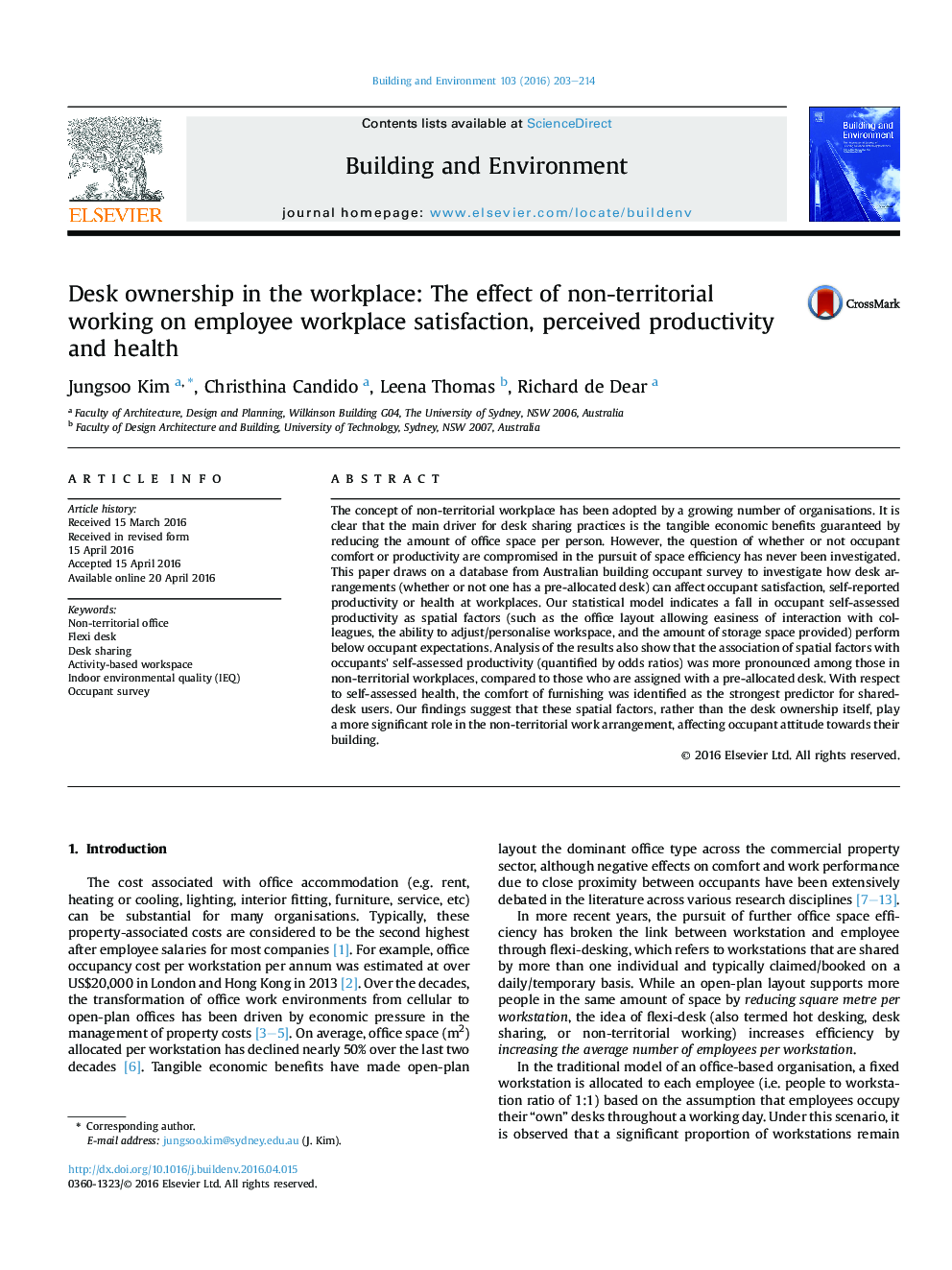| کد مقاله | کد نشریه | سال انتشار | مقاله انگلیسی | نسخه تمام متن |
|---|---|---|---|---|
| 6699242 | 502520 | 2016 | 12 صفحه PDF | دانلود رایگان |
عنوان انگلیسی مقاله ISI
Desk ownership in the workplace: The effect of non-territorial working on employee workplace satisfaction, perceived productivity and health
ترجمه فارسی عنوان
مالک میز در محل کار: تاثیر کار غیررسمی بر رضایت کارکنان کارکنان، بهره وری درک شده و سلامت
دانلود مقاله + سفارش ترجمه
دانلود مقاله ISI انگلیسی
رایگان برای ایرانیان
ترجمه چکیده
مفهوم محل کار غیررسمی توسط تعداد زیادی از سازمانها به تصویب رسیده است. واضح است که راننده اصلی برای شیوه های اشتراک گذاری میز، مزایای قابل ملاحظه اقتصادی است که با کاهش تعداد فضای اداری در هر فرد تضمین می شود. با این حال، سوال در مورد اینکه راحتی یا بهره وری مسافرتی در دستیابی به کارآیی فضا به خطر افتاده است، مورد بررسی قرار نگرفته است. این مقاله بر روی یک پایگاه داده از نظر سنجی ساکنان ساختمان استرالیا به منظور بررسی نحوه توزیع میز (آیا یا نه دارای یک میز مخصوص از پیش تعیین شده) می تواند بر رضایت شغلی، بهره وری خود گزارش شده یا سلامت در محل کار تاثیر بگذارد. مدل آماری ما نشان می دهد که کاهش بهره وری خود ارزیابی اشخاص به عنوان عوامل فضایی (مانند طرح دفتر اجازه می دهد تا راحت شدن تعامل با همکاران، توانایی تنظیم / شخصی سازی فضای کاری و میزان فضای ذخیره سازی ارائه شده) نشان دهنده پایین بودن انتظارات شغلی است. تجزیه و تحلیل نتایج نشان می دهد که همبستگی عوامل فضایی با بهره وری خود ارزیابی اشخاص (با نسبت شانس) با توجه به آنهایی که در محل کار غیر محیطی قرار دارند، نسبت به افرادی که با یک میز مخصوص از قبل تعیین شده اند، مشخص تر است. با توجه به سلامت خود ارزیابی شده، راحتی از مبلمان به عنوان قوی ترین پیش بینی کننده برای کاربران میزبان مشترک شناخته شده است. یافته های ما نشان می دهد که این عوامل فضایی، به جای مالکیت میز، نقش مهمی در ترتیب کار غیر سرتاسری دارد که نگرش شغلی نسبت به ساختمان آنها را تحت تاثیر قرار می دهد.
موضوعات مرتبط
مهندسی و علوم پایه
مهندسی انرژی
انرژی های تجدید پذیر، توسعه پایدار و محیط زیست
چکیده انگلیسی
The concept of non-territorial workplace has been adopted by a growing number of organisations. It is clear that the main driver for desk sharing practices is the tangible economic benefits guaranteed by reducing the amount of office space per person. However, the question of whether or not occupant comfort or productivity are compromised in the pursuit of space efficiency has never been investigated. This paper draws on a database from Australian building occupant survey to investigate how desk arrangements (whether or not one has a pre-allocated desk) can affect occupant satisfaction, self-reported productivity or health at workplaces. Our statistical model indicates a fall in occupant self-assessed productivity as spatial factors (such as the office layout allowing easiness of interaction with colleagues, the ability to adjust/personalise workspace, and the amount of storage space provided) perform below occupant expectations. Analysis of the results also show that the association of spatial factors with occupants' self-assessed productivity (quantified by odds ratios) was more pronounced among those in non-territorial workplaces, compared to those who are assigned with a pre-allocated desk. With respect to self-assessed health, the comfort of furnishing was identified as the strongest predictor for shared-desk users. Our findings suggest that these spatial factors, rather than the desk ownership itself, play a more significant role in the non-territorial work arrangement, affecting occupant attitude towards their building.
ناشر
Database: Elsevier - ScienceDirect (ساینس دایرکت)
Journal: Building and Environment - Volume 103, July 2016, Pages 203-214
Journal: Building and Environment - Volume 103, July 2016, Pages 203-214
نویسندگان
Jungsoo Kim, Christhina Candido, Leena Thomas, Richard de Dear,
